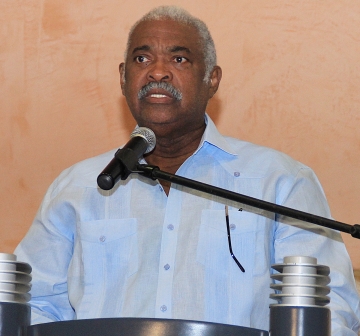Radhames Martinez, Dominican Republic’s Tourism Deputy Minister

During one of the sessions of DATE 2015, recently held in the Dominican Republic, the Caribbean News Digital sat down with the host country’s deputy minister of Tourism, Radhames Martinez, who shared his views on the upcoming step his beautiful nation is to take in a bid to further enhance its successful travel industry.
On the refurbishment of hotels along the seaside promenade, when will the travel-oriented support for tourists to stroll and have fun be ready?
We must organize the city, not just only the seaside promenade. If the tourist is staying in a hotel and walks out to enjoy this walkway by the sea, the place needs to be quiet, safe and well-lit. This is a right not only tourists are entitled to, but also the locals. As a matter of fact, a number of meetings with the Ministry of Home Affairs, the Police Department and the City Hall have been held in order to work out all this. We’ve chipped in resources to try to upgrade the Güibia Square and other contributions have been made to the local management in an effort to improve facilities along the seaside promenade. But this is a very complex problem because the Malecon is just one of the four-lane avenues that run through the National District from east to west. This has made it a fast and heavy-traffic road. Until the beltway is finished we can’t think of a final solution for this area.
The Malecon is dotted with street vendors, especially Haitians who bring their paintings. That’s also a major tourist allure that poses a number of inconveniences. Where will they be located is they are gone?
That’s a lesser problem. The solution we have thought of is to locate them in specific areas. When the circulation issue is finally worked out, then we’ll go into the details.
In his speech at the Summit of the Americas in Panama, President Danilo Medina outlined three basic messages: immigration, security and the battle against drugs. Is the Tourism Ministry taking on those three issues right now?
Our Minister, as a member of the Cabinet, ought to follow those guidelines wielded by the President. But in fact none of those issues falls under the jurisdiction of the Tourism Ministry, even though we do cooperate with the law enforcement agencies and other institutions that do deal with those matters.
As to tourist safety and security in the strict sense of the word, there’s an old resolution issued by the Ministry of Tourism which mandates hotels to have a video-surveillance system on the corridors and the surrounding areas. This wasn’t understood well by the sector because many believed it was a violation of people’s privacy. But it was just a matter of understanding because we were not telling the owners to install the surveillance system inside the rooms, but in strategic locations, such as foyers and corridors, just to record potential happenings and occurrences. That’s a way to keep tourists protected.
The issue of cabs is equally important for the travel sector. How has this aspect been developed in the Dominican Republic?
I admit we must improve transportation overall, not only with taxis. Most tourist areas have powerful trade unions. This ought to be a slow process just to avoid putting the interests of local stakeholders on the line.
A new layout has to be designed. I think we were too resilient in the past by allowing too many companies to pop up. Now we’ll be embarking on a study on the conditions and use of the coastal areas because all of a sudden we have too many nautical activities that should be regulated in line with existing capabilities.
We’re precisely calling on the Deputy Ministry of Marine Coastal Resources and the Army to start a reassessment process of the entire coastal zone.














